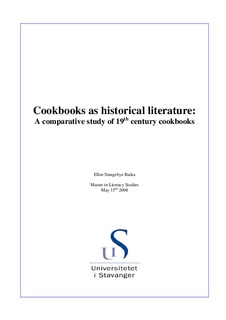Cookbooks as historical literature : a comparative study of 19th century cookbooks
Master thesis
Permanent lenke
http://hdl.handle.net/11250/185354Utgivelsesdato
2008Metadata
Vis full innførselSamlinger
- Student papers (HF-IKS) [909]
Sammendrag
Cookbooks have been long regarded as little more than instructional manuals. However, recent research has repositioned the cookbook genre as historical literature. This thesis is a comparison of two 19th century cookbooks: the American cookbook Miss Beecher's Domestic Receipt Book written by Catherine Beecher and published in 1850 and the Norwegian cookbook Lærebog i de Forskjellige Grene af Huusholdningen (Textbook in the different Subjects of the Household) written by Hanna Winsnes and published in 1845. Both books are aimed at middle class housekeepers and contain a vast amount of general advice on how to manage large households. This includes recipes on cooking with advice on how to grow, buy, keep, cut, and preserve different foods. In addition, both books include information on the administrative aspects representative of large households in the mid 1800's.
This comparative study of Winsnes' and Beecher's cookbooks addressed two main categories: 1) food preparation and, 2) administrative organization of households. The food preparation section contains a discussion of four groups of alimentation: meat, dairy products, brewing and drinking, and baking. The administrative section examines four areas relevant to the historical context: eating habits, technological advances, household organization and attitudes towards servants. The aim of the comparison was to discern similarities and differences in housekeeping in Norway and the United States in the mid 1800's.
The following research questions were addressed: How can historical cookbooks be analyzed as historical literature? Further, can historical cookbooks be seen as women's literature, and if so, what kinds of literature is this? And finally, can a comparison of an American cookbook and a Norwegian cookbook published in the mid 1800's contribute to a better insight in housekeeping in the 19th century?
This thesis argues that 19th century cookbooks can be analyzed as historical literature due to their content of much more information than recipes and cooking instructions. My claim is that the definitions of the word cookbook in today's dictionaries, such as Webster's definition: "a book containing recipes and instructions for cooking", are
insufficient. Nineteenth century cookbooks functioned as much more than reference books on food preparation, as they encompassed many genres, such as autobiography and information on management training, moral behavior, baking, cleaning, repairing, nursing, as well as technical instructions on butchering. These cookbooks, termed “historical cookbooks,” may be seen as cross-genre, not necessarily consistent with the accepted definitions of traditional cookbooks. 19th century cookbooks were written by and for women, and they served an educational purpose, as they functioned as textbooks aimed at women.
Beskrivelse
Master's thesis in Literacy studies
